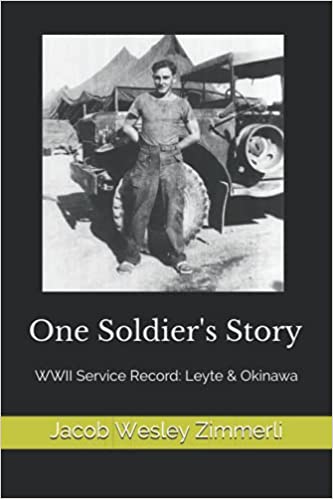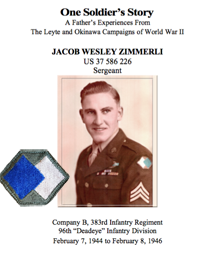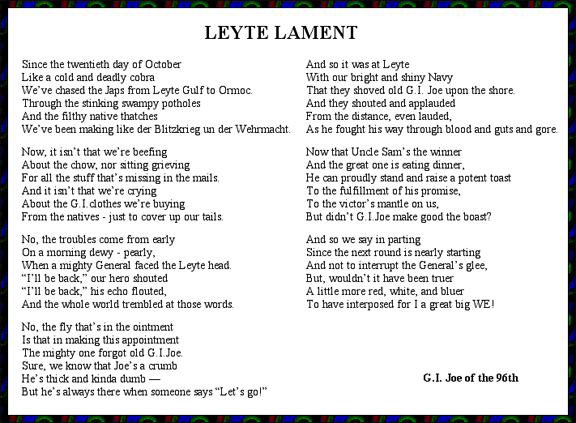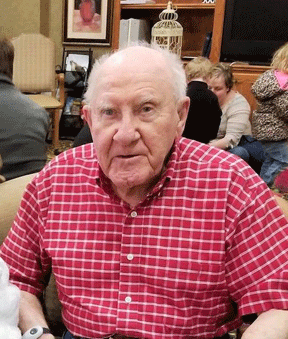
| |
|
|
|
JACOB WESLEY ZIMMERLI
Deadeye
96th Infantry Division
Company B, 383rd Infantry Regiment
February 7, 1944 - February 8, 1946 |
|
| |
|
|
|
|
|
| New Publication
"One Soldier's Story"
WWII Service Record: Leyte & Okinawa |
 |
| |
|
|
A Father’s Experiences From
The Leyte and Okinawa Campaigns of World War II |
|
| |
|
|
|
 |
"I remember that the bunks were five high in the sleeping quarters on the transports. I always tried to get the top bunk because in rough seas someone was sure to get seasick and I didn’t want them above me. It wasn’t usually too hard to get the top bunk because many of the men didn’t want to be high up because of the motion. The bunks had only about eighteen inches between them. On the LST’s the bunks were only three high because they had less space between decks." Pg 14
|
|
"I remember when we boarded the LST we had to climb up cargo nets to get on deck. This is quite a job, if you have not done it before, because you have to be ready and catch the cargo net with your hands when the boat rises on the waves. If you grab the net when the boat is down you are in danger of getting your legs between the boat and the ship when the waves push the boat up. Most of us were able to do this all right, and no one was hurt.
When we were climbing up the net to board the LST I was right over the diesel exhaust. This would have been O.K. if we were able to keep moving up, but for some reason the men on the net above me stopped and I was stuck right over the exhaust with no place to go. When I finally got on deck, I was really sick for a while from the diesel fumes. This was the only time I was sick while on a ship." Pg 16
|
|
| |
|
|
|

A Deadeye Buddy of Jacob Zimmerli wrote "Leyte Lament." |
|
| |
|
|
|
| |
|
|
|
"I was riding in the bow of the craft, right against the ramp that would be lowered, and Lt. Hanna was next to me. We would be the first two men to leave the alligator. You could see some of the men praying and others who were grimly silent. We were all crouched down just waiting for the first bullets to hit our craft or fly overhead. We went across the beach and into the jungle. We could see the palm trees overhead. Finally Lt. Hanna told the driver to stop. He knew we were further in than we were supposed to go. Just before the ramp was lowered I felt the sting of a bullet hitting the ramp. It may have been a ricochet from one of our own troops or it could have been fired from the enemy.
When the ramp went down we went out of the alligator, each one going to the right or left when we got on land. We fanned out and took cover, waiting for Lt. Hanna to give us our orders.
To our great surprise, there were no Japanese troops or resistance to our landing. We cautiously began to move forward through the jungle. In three-quarters of an hour we had moved inland over a thousand-yards with no sight of any enemy. There had been some sporadic mortar and artillery fire, but we had not lost any men." Pg 17
|
|
| |
|
|
|
Mr. Zimmerli was there, right in the thick of battle and he tells his story with vivid descriptions. I makes the reader really understand how war was for this young man. *****
|
|
| |
| |
|
|
"As dawn broke over the China Sea that Easter Sunday, April 1, 1945, the whole fleet lay in position off shore. Overnight, the clouds had vanished, giving way to a clear, bright morning. Recon planes hovered over the island, while other planes flashed down out of the blue to deliver loads of bombs on the beaches. We could hear the booms and see the flashes of the big guns as the battleships and cruisers rained their deadly fire on the targets on shore. Hundreds of boats and landing craft jockeyed for position, and then the strange and terrible Easter parade got under way.
In the hours just before the assault, the bombardment swelled, and at one minute before 8 a.m., the first waves of assault craft were on the way. While we were on our way, racing shoreward, the rocket and mortar-craft that were close in unleashed their shells on the beach. I had never seen such a sight before; the sky was literally filled with rockets and mortar shells going overhead. |
|
 |
| H-hour had been chosen at high tide so the assault craft could get over the reef. We got over the reef, but then our craft came upon rocks that were too big for them to go over. Moving our tank up to one of these rock ledges, we put up short ladders and climbed up on the land. I think this was a part of the ancient seawall. As we clambered up onto land, only a half-hour had past since the assault began . . ." Pg 29 |
| |
|
|
|
|
| |
|
|
|
| CLICK to download the entire story! |
|
| |
|
|
|
| |
|
|
|
 |